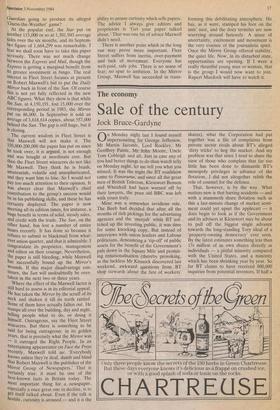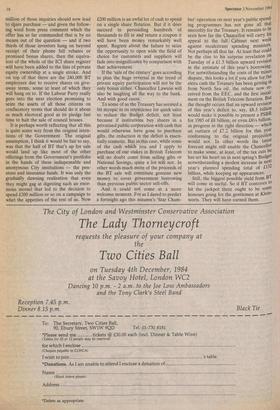The economy
Sale of the century
Jock Bruce-Gardyne
rAn Monday night last I found myself V impersonating Sir George Jefferson, Mr Martin Jacomb, Lord Rockley, Mr Geoffrey Pattie, Mr John Moore, Uncle Torn Cobleigh and all. Just in case any of you had better things to do than watch telly on Monday night, let me tell you what you missed. It was the night the BT roadshow came to Panorama, arid since all the great men of British Telecom, Kleinwort Benson and Whitehall had been warned off by their lawyers, the poor old BBC was left with yours truly.
Mine was a. somewhat invidious role. The Beeb had decided that after all the months of rich pickings for the advertising agencies and the `meejah' while BT sof- tened up the investing public, it was time for some knocking copy. But instead of interviews with union leaders and Labour politicians, denouncing a `rip-oft of public assets for the benefit of the Government's pals down in the Square Mile and promis- ing renationalisation (thereby provoking, as the luckless Mr Kinnock discovered last weekend, awkward questions from BT shop stewards about the fate of workers' shares), what the Corporation had put together was a file of complaints from private sector rivals about BT's alleged `dirty tricks' to hog the market. And my problem was that since I tend to share the view of those who complain that far too little has been done to dismantle BT's monopoly privileges in advance of the flotation, I did not altogether relish the role of counsel for the defence.
That, however, is by the way. What matters now is that barring accidents — and with a mammoth share flotation such as this a last-minute change of market senti- ment could yet upset the applecart — it does begin to look as if the Government and its advisers at Kleinwort may be about to pull off the biggest single advance towards the long-standing Tory ideal of a `property-owning democracy' ever seen. By the latest estimates something less than 13/4 million of us own shares directly as individuals — a pitiful minority compared with the United States, and a minority which has been shrinking year by year. So far BT claims to have received 800,000 inquiries from potential investors. If half a
million of those inquiries should now lead to share purchase — and given the follow- ing wind from press comment which the offer has so far commanded that is by no means out of the question — and if two thirds of those investors hang on beyond receipt of their phone bill rebates or promised bonus shares, then the equiva- lent of the whole of the ICI share register will have been added to the lists of private equity ownership at a single stroke. And on top of that there are the 240,000 BT employees due to receive shares on give- away terms, some at least of which they will hang on to. If the Labour Party really goes into the next election promising to seize the assets of all those citizens on confiscatory terms that should do it about as much electoral good as its pledge last time to halt the sale of council houses.
It is perhaps worth reflecting that all this is quite some way from the original inten- tions of the Government. The original assumption, I think it would be fair to say, was that the half of BT that's up for sale would land up like most of the other offerings from the Government's portfolio in the hands of these indispensable and anonymous City institutions — the pen- sions and insurance funds. It was only the gradually dawning realisation that even they might gag at digesting such an enor- mous morsel that led to the decision to spend £200 million or so on a campaign to whet the appetites of the rest of us. Now £200 million is an awful lot of cash to spend on a single share flotation. But if it does succeed in persuading hundreds of thousands to fill in and return a coupon it will have been money remarkably well spent. Regrets about the failure to seize the opportunity to open wide the field of choice for customers and suppliers will fade into insignificance by comparison with that achievement.
If the 'sale of the century' goes according to plan the huge reversal in the trend of private equity participation will not be the only bonus either. Chancellor Lawson will also be laughing all the way to the bank. And with good cause.
To some of us the Treasury has seemed a bit myopic in its impatience for quick sales to reduce the Budget deficit, not least because if institutions buy shares in a privatised public corporation with cash that would otherwise have gone to purchase gilts, the reduction in the deficit is essen- tially cosmetic. But in this case, while some of the cash which you and I apply to purchase of our stakes in British Telecom will no doubt come from selling gilts or National Savings, quite a lot will not. In other words much more of the proceeds of the BT sale will constitute genuine new money to cover government borrowing than previous public sector sell-offs.
And it could not come at a more welcome moment. For as I dared to predict a fortnight ago this autumn's 'Star Cham-
ber' operation on next year's public spend- ing programmes has not gone all that smoothly for the Treasury. It remains to be seen how far the Chancellor will carry his appeal to the full Cabinet next week against recalcitrant spending ministers. Not perhaps all that far. At least that could be the clue to his surprise revelation on Tuesday of a £1.5 billion upward revision in the estimate of this year's borrowing• For notwithstanding the costs of the mines dispute, this looks a lot if you allow for the extra cash the Treasury has been getting in from North Sea oil, the rebate now re- ceived from the EEC, and the first instal- ment on the British Telecom flotation. But the thought occurs that an upward revision of this year's deficit to, say, £8.5 billion would make it possible to present a PSBR for 1985 of £8 billion, or even £81/4 billion, as progress in the right direction — which an outturn of £7.2 billion for this year conforming to the original projection would not. In other words the latest forecast might still enable the Chancellor to make some, at least, of the tax cuts he has set his heart on in next spring's Budget notwithstanding a modest increase in next year's planned 'spending total of £132 billion, while keeping up appearances.
Still, the biggest possible yield from BT will come in useful. So if BT contrives to hit the jackpot there ought to be some honours going for the gentlemen at Klein' worts. They will have earned them.











































 Previous page
Previous page